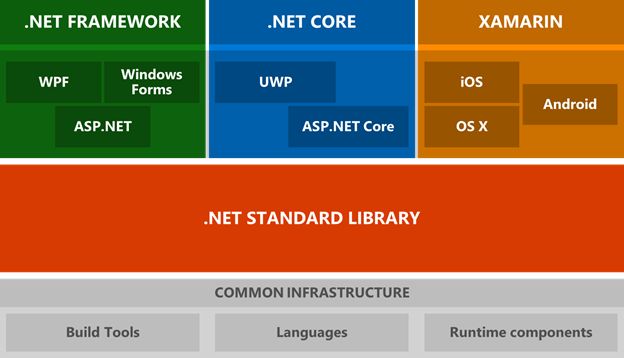
March 19, 2024 08:03 by
 Peter
PeterThe ".NET Framework" and ".NET" (previously known as ".NET Core") are two distinct implementations of the.NET platform, each having a different purpose and addressing various scenarios. However, they share a similar ancestor and are part of the larger.NET ecosystem.

Differences
- .NET Framework: The .NET Framework is the original implementation of the .NET platform, introduced in the early 2000s. It is primarily designed for building Windows-based applications, including desktop applications, web applications, and services. It includes libraries such as Windows Forms, ASP.NET Web Forms, and WPF.
- .NET (formerly .NET Core): .NET (or ".NET 5" and later versions) is a modern, cross-platform implementation of the .NET platform. It is designed to be lightweight, modular, and highly scalable, with support for building applications on Windows, Linux, and macOS. It includes libraries such as ASP.NET Core, Entity Framework Core, and ML.NET.
Evolution: For many years, the.NET Framework served as the platform's foundation. However, as the computing landscape developed, Microsoft introduced.NET Core as a modern, cross-platform alternative to the.NET Framework's restrictions. In November 2020, Microsoft combined.NET Core,.NET Framework, and Xamarin into a single.NET platform dubbed ".NET."
Migration Path: Although.NET Core and.NET Framework have different implementations, Microsoft has given tools and guidelines to help developers move their existing.NET Framework programs to.NET Core and, eventually, to.NET.
European best, cheap and reliable ASP.NET hosting with instant activation. HostForLIFE.eu is #1 Recommended Windows and ASP.NET hosting in European Continent. With 99.99% Uptime Guaranteed of Relibility, Stability and Performace. HostForLIFE.eu security team is constantly monitoring the entire network for unusual behaviour. We deliver hosting solution including Shared hosting, Cloud hosting, Reseller hosting, Dedicated Servers, and IT as Service for companies of all size.
